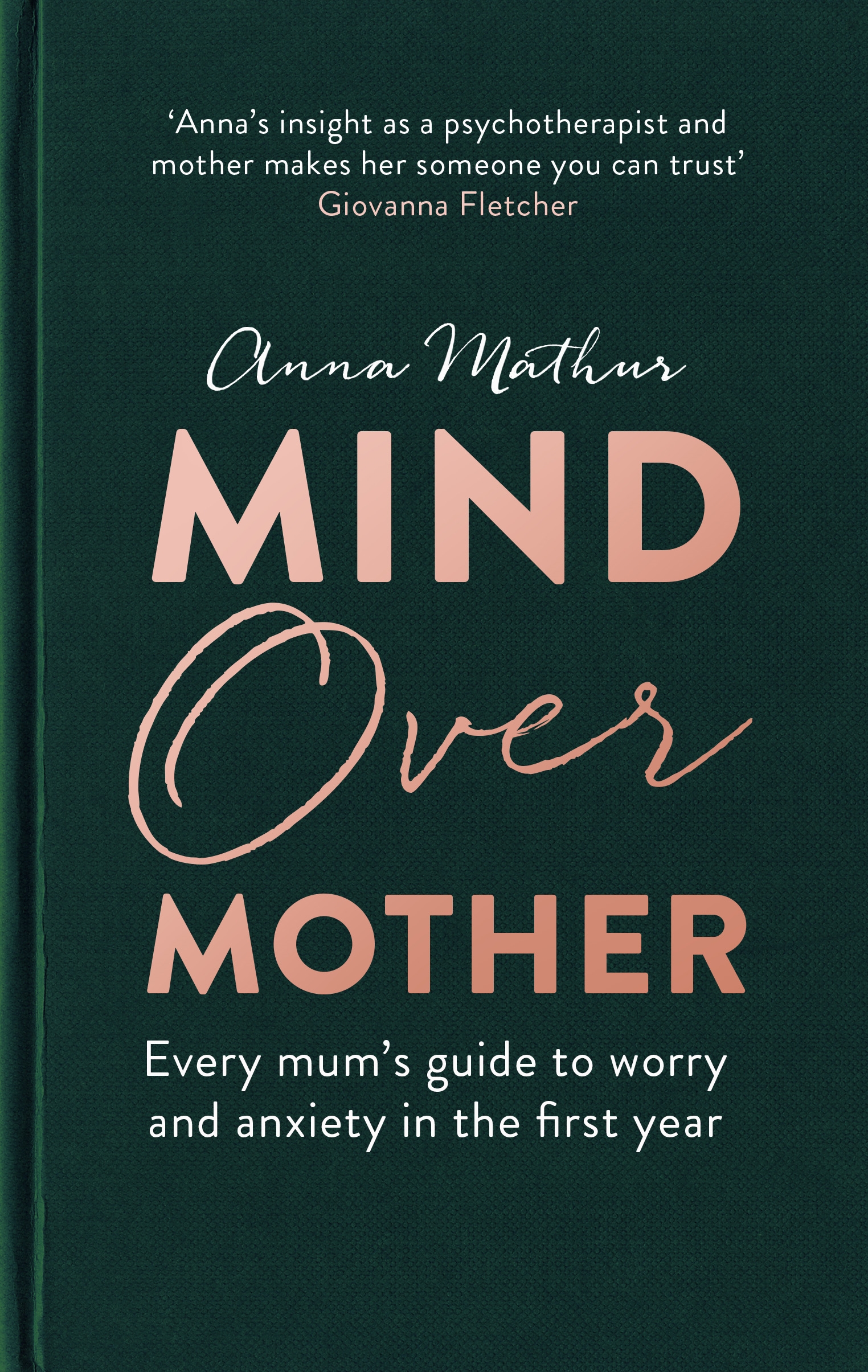5 Tips for a happier motherhood
Motherhood can be the most wonderful, yet toughest time of your life, but what can you do to ensure you get the enjoy all the good parts? Psychotherapist and author of Mind Over Mother, Anna Mathur, explains her top five pieces of advice for a happier motherhood.

If you asked most people what they wanted for their children, they would say ‘Happiness’. I’ve never come across a single person seeking less happiness in their life. Yet happiness gets driven out as we find ourselves surviving rather than thriving. Ease and joy can so easily get squeezed out of hearts and minds to make space for thoughts of worry and the ‘what if’s’, as life whizzes by in a blur of logistics, boxes that need ticking, snacks that need making.
As mothers, as we move through the motions of every day life, our focus is on meeting the needs of those around us, ensuring they are happy. But what about us?
In my new book Mind Over Mother I discuss how your needs and feelings are equally as valid as the needs and feelings of those you love. You are as worthy of happiness as your children are. In motherhood, your feelings, needs and happiness can so easily become deprioritised for another day, or another year when the to-do list is shorter and the days are calmer. It’s time to shift the focus, and move yourself back up that list of priorities. So how do we do this?
Here are my five top tips for a happier motherhood…
1. Self-care
Self-care is so much more than diving into a hot bubble. How we treat ourselves is intrinsically linked to self-worth, and increased self-worth leads to increased happiness! Self-care is the acknowledgement of your needs, feelings, opinions and valuing yourself enough to make choices that meet or validate them. You could repeat self-loving statements to yourself on loop, but unless you also address how you treat yourself, they will simply be water off a duck’s back.
Many of us equate loving our families with completely denying our own feelings, needs, wants. But what ends up happening instead, is that whilst those around us are happier, we end up exhausted, overwhelmed, irritable and snappy.
Life is so much more enjoyable when you aren’t living at the very edge of your resources. Consider how your child’s understanding of their worth would shift if you ignored their basic needs? Their self-worth would dip, just as yours does when you ignore your own.
These little gestures are statements of worth. We are telling ourselves we are equally worth being hydrated, patience, well-rested, and fed as our children are. They might seem little, but the little things have the power to make big changes in how we value ourselves.
Some examples of self-care might be as simple as going to the loo when you need it, rather than hopping around the kitchen as you get your own child a drink! It may be doing some exercise, calling a friend when you feel low, going to bed earlier, or validating a feeling that passes by.
2. Put an end to comparison
It’s so easy to compare our situations, feelings, ways of parenting. We often compare in the hopes of finding confirmation that we are doing a good job. But instead we tend to be drawn to those shiny images, those lives of others, and conclude the exact opposite. You know how they say in casinos, that the house always wins? Well, in comparison, at the end of the day, you will end up being robbed of confidence and happiness.
It’s so good to notice when you are invalidating your own very valid emotions by telling yourself that you ‘shouldn’t’ feel something because someone else has it worse, harder, sadder. When we invalidate our emotions, we prevent ourselves from feeling them. They don’t go away, they just get swept under the rug, only to trip us up later.
Next time you feel something, anything, just let it be. Noticing it, or jotting it down in a journal is a way of validating it. Feelings come like waves, or labour contractions. Notice it, let it peak, and trust that it will subside. This way, it is far less likely to spurt out sideways, like steam out of a pressure cooker valve, erupting as tears over something seemingly insignificance. Feelings move and pass as they are felt, making way for more happiness and contentment!
When we compare ourselves to others, we amend our understanding of how well we’re doing dependent on our conclusion. It’s a lot of power to be giving away, allowing the half-stories, and filtered images to dictate your worth. Coach yourself through these moments in the way you would guide someone you care about.
3. Strengthen the muscle of vulnerability
We’re told ‘it takes a village’ to raise a child, yet it’s so common for us to act as our very own one-woman village. Self-sufficiency is so praised in our culture, that we may feel a failure if we find ourselves needing to ask for support, share emotions, or admit a need.
No matter how efficient, organised and experienced we are, we simply are not created to do this motherhood journey alone. Whether your ‘village’ is online, off-line or a mixture of both, having people to talk to, share with and lean on is vital for positive mental health and happiness.
You don’t have to tell everyone everything, but it’s so good to have at least two people in your life who get more than the simple ‘I’m fine thanks’ response. One may be a professional such as a health visitor or therapist, another might be a friend or family member.
Whilst the word ‘vulnerability’ may conjure up images of a defenceless newborn baby it’s also a thing of such strength. Being open and honest, can feel like a muscle that needs to be strengthened, especially when we’ve felt misunderstood or our honesty has been abused in the past. Choose people who have historically been kind and warm in their response to you, and take small risks of vulnerability with them. Perhaps it might be that you share a little more than ‘all good here’ in a message response, or you accept an offer to watch the baby whilst you rest, whereas before you’d have declined out of worry of being a burden. Little by little, strengthen that muscle of vulnerability.
4. Practice gratitude
Gratitude has become quite the buzz word, and rightly so! It is a brilliant and powerful way to quickly usher more happiness into your life. Gratitude draws our focus from what could go wrong, to what is good and going right in our lives.
I find it so helpful to switch up ‘I’ve got to’ to ‘I get to’. I recently used it whilst doing the washing, finding myself exasperated at the relentlessness of it all. It turned ‘I’ve got to do yet another load of washing’ into ‘I get to do another load of washing. Clothes worn by my children who I’m so blessed to have. I’m using a washing machine, an item not available to so many people in the world, housed within a home that keeps us safe and warm’. What was in one moment a boring job I resented, suddenly had me feeling happy and fuzzy.
It is so important that gratitude isn’t used to shame very valid emotion. Such as ‘I shouldn’t find this hard, because I’m so lucky’. You can feel a whole host of seemingly conflicting emotions all at once. You can feel overwhelmed AND lucky. Sad AND grateful. Gratitude merely lights a candle in what may otherwise be a dark room. It turns what we have, into enough and can bring balance to emotion and experience.
5. Halt overthinking and worry
I don’t know about you, but I can suddenly find myself knee-deep in the emotions of things that haven’t actually happened yet. My mind easily goes meandering off down a road of ‘what if’s’, playing out unpleasant, potential scenarios that end up with me feeling sad, scared or experiencing waves of grief for someone I’ve not actually lost!
When you become a mother, you experience love in a whole different way. It can feel a very vulnerable thing to love someone so much, that you can experience an uplift in fear of life’s curveballs such as loss or bad health. These kinds of anxious thoughts falsely give us a sense that if we think about all the worst-case scenarios, we will be somehow more prepared and in control should they come to fruition.
However, this isn’t true! We feel emotions as they arise and no pre-thinking can manipulate how we’d feel should a curve-ball hit. All overthinking does, is rob us of our potential to experience the moment we are living in. It replaces happiness with fear. My favourite tip to halt overthinking, is to count backwards from 100 in 3’s! You simply cannot continue off down the road of scary future possibilities whilst doing this. Use a simple breathing exercise to calm your body if you feel tense or anxious as a result of what you’ve been thinking about (try in for 4, out for 6).
The more sensitive you become to recognising where those cycles of overthinking begin, the sooner you can implement a distraction technique to stop it. This enables you to be more in the moment, where the living and the loving is to be done.
In conclusion, us mum’s often don’t have the headspace or energy to make huge changes, but be reassured, little tweaks like these are not to be underestimated! They can have such a big impact on your happiness levels in time. Amazingly, if you nudge the flight path of a plane by a single degree, it will end up on an entirely different continent!


Find out more about Anna Mathur at www.annamathur.com or on Instagram page @annamathur.









